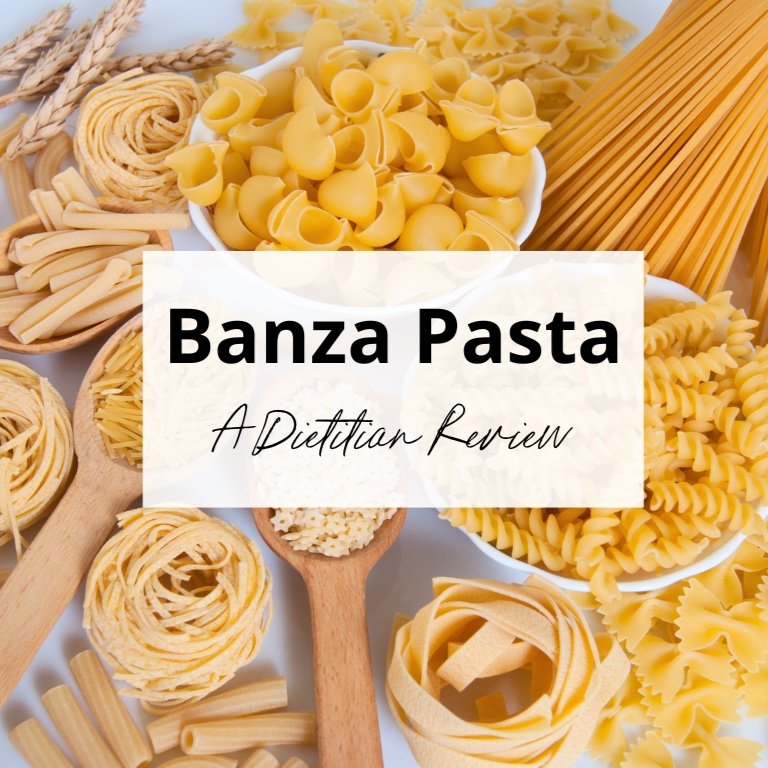Banza- A Dietitian Review
If you are looking for a way to make a high protein bowl of pasta, then Banza may have caught your eye at the store. Today we are going to do a deep dive into Banza so that you can decide if this chickpea based pasta alternative is right for you!
As a Registered Dietitian, I am constantly asked about new food products and emerging health trends. While some of these products and trends are just that -a trend- there are others that I predict are here to stay. Read some of my other product reviews like:
One brand that I think is here to stay is Banza, a chickpea based pasta alternative. Today we are going to do a deep dive into this bowl of “noodles” and decide if you should (or should not) be adding Banza to your cart!
What is Banza?
Banza is a chickpea based pasta alternative stating that their pasta has 50x the protein, 3x the fiber, and 25% fewer net carbs than regular pasta…we will take a look at what that actually looks like later in the blog. Beyond that, Banza states that their pasta taste is rated 5 stars with over 1000 reviews online.
While it started as pasta, Banza has expanded its product line over the years and now include products like:
Rice
Pasta varieties
Mac and cheese
Pizza
Protein waffles
Quite a few product options from a humble chickpea! For the sake of this blog, we are going to focus primarily on their pastas.
Banza Ingredients
As mentioned, Banza creates chickpea based products but that does not mean that chickpeas are the ONLY ingredient in these products. While the ingredients lists do vary by product, their rice and noodles feature these ingredients:
In the rice and noodles:
Chickpeas: listed first on the ingredients list, chickpeas are the majority ingredient in Banza products.
Pea Starch: pea starch helps hold the produce together when it is cooking and, when it gels up, results in a softer and more elastic product.
Tapioca: tapioca thickens recipes and helps bind ingredients together.
Xantham gum: this is a common thickening ingredient that adds volume to recipes. According to their website, the Xantham gum that Banza uses is derived from corn (something to note if you have a corn allergy.)
Again, the Banza pizza crust, Banza mac and cheese, and Banza protein waffles ingredient lists will vary.
How Does Banza Taste?
Banza recently revamped their recipe and the taste and texture of the noodles are one of my favorites of all the pasta alternative brands! Personally speaking, I enjoy the taste and texture of their pastas like rotini over their spaghetti. While the noodles are slightly less durable, as in they may fall apart or break in half in a pasta salad or spaghetti, the texture and flavor of Banza is decently similar to that of a traditional noodle.
Based on a 2 oz serving (Banza vs Barilla spaghetti vs Barilla red lentil spaghetti vs Explore edamame spaghetti)
How Does Banza Compare to its Competitors?
There are a few pasta competitors in the space including regular noodles, lentil based noodles, and edamame noodles which is what I chose to include in the above comparison chart. This does not represent all competitors, but you will quickly notice that
Compared to regular noodles:
The Banza website states that their pasta has 50x the protein, 3x the fiber, and 25% fewer net carbs than regular pasta. I compared Banza spaghetti to a leading spaghetti noodle competitor and you can see the nutritional differences between the two. Banza does have slightly lower calories, lower carbohydrate content, more of that carbohydrate content containing fiber, and higher protein content. This could be enough of a nutritional difference to have people reaching for Banza instead of traditional spaghetti… and I could see why!
I do think it’s important to point out that, while Banza pastas are nutritionally superior on paper, this does not mean that traditional pasta is bad for you or completely void of nutrients. Even the pasta above features 3 grams of fiber and 7 grams of protein… for a much more affordable price. Through the addition of nutritious ingredients like meat, dairy, and vegetables, you can even out and even surpass the nutritional differences on just the noodle basis.
Personally, I would also say that traditional pasta still wins in flavor, overall texture, and durability. If you have a recipe that you want to meal prep or eat over a few days, I highly recommend using a traditional pasta as it will maintain its texture better.
Compared to red lentil noodles:
As seen in the graph above, the nutritional profile of Banza pasta is incredibly similar to red lentil noodles and likely other bean or legume brands. The Barilla red lentil noodles, which is the brand I chose to compare to, also come in at a more affordable price for an almost equivalent nutritious bite.
I think a main difference here is that the red lentil noodles have a color whereas banza noodles do not offer any colorful noodle options. If you want to make a high protein pasta that calls for tri-color noodles, I would recommend red lentil noodles as a nutrient dense and colorful substitute.
Compared to edamame noodles:
Looking simply at the macronutrients above, edamame noodles are the very clear winner above every option. They are similar in calorie, significantly lower in carbohydrate, higher in fiber, and much higher in protein content. Edamame is also a unique plant-protein because it is one of few plant-based complete proteins featuring all of the essential amino acids. The price per ounce is also more affordable for edamame noodles than Banza. If you want to make a true high protein pasta just with noodles, I would recommend edamame noodles.
However, Banza wins in texture and flavor in my opinion. I have cooked with these edamame noodles quite a few times and they have a grainy texture that falls apart or clumps together. While they are the clear winner on a nutrition label basis, they also need to be enjoyable and that is for you to decide.
Here’s another look at the nutritional differences!
Frequently asked questions about Banza:
1) Is Banza gluten free?
Yes, Banza products are naturally gluten free.
2) Does Banza have plant-based options?
All of the Banza rice and noodle boxes are entirely plant-based. For the pizza and Mac and cheese, there are both plant-based as well as dairy containing options.
3) Is Banza dairy-free?
The Banza rice and noodles are all naturally dairy-free and Banza does offer plant-based options for their pizza and Mac and cheese products.
4) Is Banza vegan?
Depends on what you buy! Banza does have a vegan page on their website that features all of their vegan friendly products.
Pro’s and Con’s of buying Banza:
Here are a few pro’s and con’s (with modification suggestions) that I see with the Banza products. Of course, this is my perspective as a dietitian, so you should consider these points in the context of your own diet and nutritional needs.
Pros:
2) Plant-based protein: If you want to bump up the protein content of a pasta salad, Mac and cheese, or other noodle dish then this could be an easy way to add some plant-based protein.
3) Higher Fiber: chickpeas are rich in fiber and that is reflected in the nutrition label of Banza.
4) Kid Friendly: Banza is a great way to get some protein on the plate of your kids, especially if you have a picky eater or one who doesn’t love meat, dairy, or other popular protein foods. If you have one who always reaches for noodles, Banza could be a great option.
5) Gluten free: Banza is naturally gluten free and a great option for those who need gluten free products.
Cons:
1) Price: Banza is more expensive compared to regular pasta as well as a few of its competitors that are very comparable nutritionally.
2) Less durable texture: As mentioned before, chickpea pasta is more breakable than grain based pastas after cooking. While I think Banza works well when eaten right after cooking, I have noticed that I get more breakage when I use it for meal prep or a prepped pasta salad… almost to the point of becoming inedible.
3) Taste: While I personally enjoy the flavor, some people may not enjoy the flavor as much as regular noodles. While Banza does have slightly more favorable macronutrients, I not think that the nutritional differences between Banza and regular noodles justify sacrificing the overall enjoyment of your meal.
4) No colorful options: This isn’t really that big of a deal but banza currently does not offer any trim-colored pasta options if you had wanted that for your recipe.
The Takeaway:
I personally enjoy Banza and think it’s a great product to include on your plate. It does feature plant-protein, fiber rich chickpeas, and is naturally gluten free. Many kids will eat Banza pasta and its a great option for those who want to bump up the protein in a picky eaters diet or in their own diet!
While I see Banza making its way into peoples carts, remember that it is not the only pasta alternative product out there and many other products are very comparable and even superior in nutrition, price, and maybe even taste depending on your personal preference. .
Also, remember that Banza products are not the only way to build a balanced bowl of pasta…especially if you do not enjoy the flavor! While Banza is higher in protein and fiber than regular noodles, most noodles do contain some fiber and protein of their own and remember that you can always add protein and fiber through ingredient additions as well. Additions like meat, dairy, whole beans/legumes, edamame, hardboiled eggs, and others will add plenty of protein to your pasta. Other additions like fresh vegetables are an easy and nutritious way to add fiber and micronutrients.
“Healthified” products like Banza absolutely have their place and will be enjoyed by many but it may not be the best option for you if you find that you are really sacrificing the satisfaction and enjoyment of your meal in order to include it. Try it out and decide for yourself!
Check out my other reviews:
Read some of my other product reviews like:
Disclaimer: please note that I am a registered dietitian but I am not YOUR registered dietitian. This information is meant to be educational and should not be used as personalized medical or nutrition advice. All opinions are my own and if something was sponsored it will always be disclosed. This blog may contain affiliate links and any purchase made through my links gives me a small commission and supports Lauren Twigge Nutrition. Hey! I’m Lauren
Feeling overwhelmed by the ever-changing products, hacks, and programs that all say they’re the next best thing? I have reviews from a registered dietitian!






